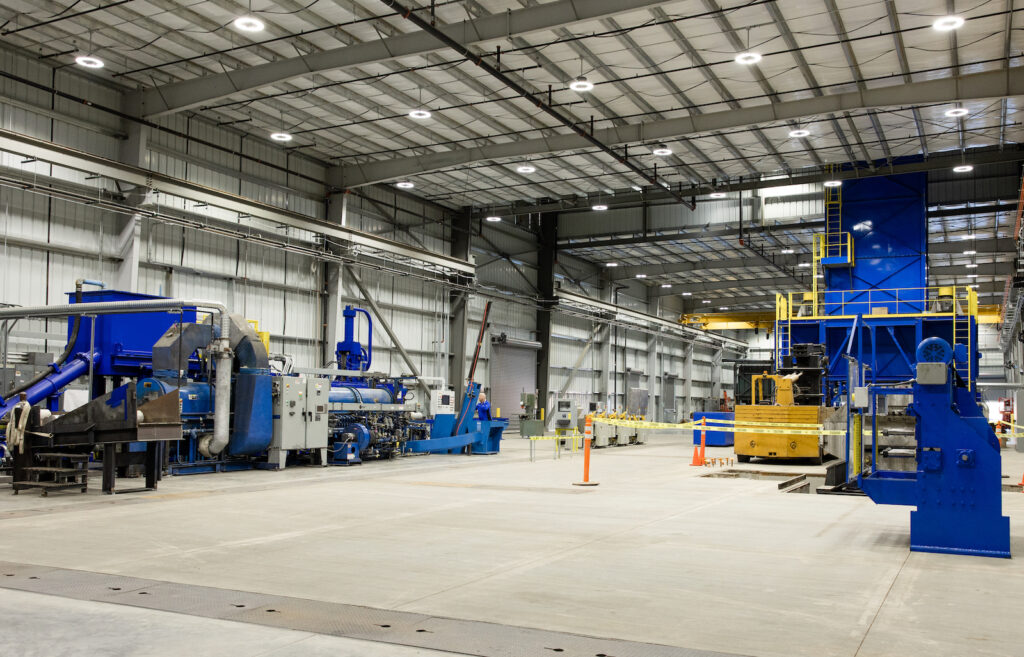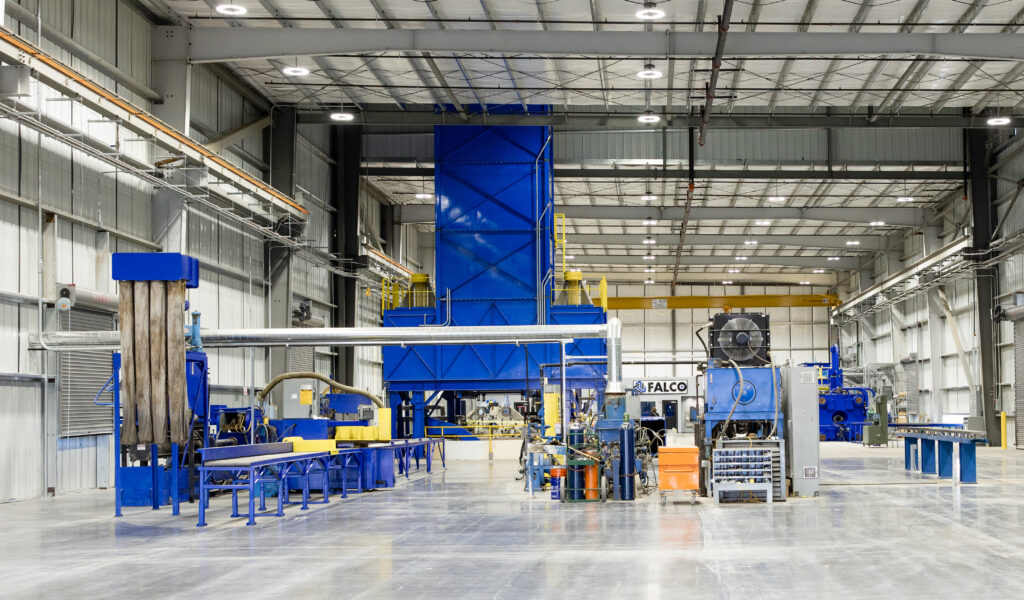
Located at the Lone Butte Industrial Park within the Gila River Indian Community near Phoenix, AZ, FALCO is a new women-owned and family-run extrusion company currently in the process of starting up its extrusion operations. The company aims to produce hard alloy products for the aerospace and other industries, with a high level of customer service, along with a work environment and management approach that supports its employees and their families.
Company Profile
FALCO was founded by the Fraley family in 2019. However, despite being so new, the company leadership has a long legacy in the aluminum extrusion industry. Bob Fraley was a key player in launching Pimalco, Inc. in 1973, which became a world leader in the supply of small to intermediate sized hard alloy extrusions. After Pimalco was bought by Alcoa in 1985, Fraley later started up a new extrusion company, Alexco, in 1997, which was eventually sold to Kaiser in 2011 after his retirement.
After Alexco was sold, sons Greg, Perry, and Michael Fraley continued working at Alexco until 2018, when they left to pursue other interests. “We did not initially have any plans about getting back into the extrusion business,” said Perry. “But our dad pointed out that, if you want to start a company, it’s best to go into a business you know—and we know extrusion. Around the same time, Greg found a piece of extrusion equipment in Michigan, and we made an offer on it, which got the ball rolling.”
When planning the business infrastructure for FALCO, it was important to everyone that the company remain a family business. “The F in FALCO stands for three things: faith, family, and female owned,” said Greg. “We knew from the start that we wanted to put the majority ownership of this company under our wives and our mother—all of whom have experience working with us in the past. That was really the motivating factor for us in the whole deal.”
Thus, Heather Chasten was appointed president of FALCO. She seemed an obvious choice to the team, considering her more than 26 years of experience in the extrusion industry, having previously worked at both Pimalco and Alexco. Over the years, she has gained a wealth of industry knowledge, particularly in terms of quality control and sales. “It was a no brainer,” noted Greg. “She is highly regarded by OEMs in the aerospace industry as one of the top quality assurance people in the extrusion industry.”
In addition, Greg serves as chief operating officer, Perry as VP of business development, and Michael as VP of customer relations. Altogether the management team has over 300 years of experience combined. “We have been working hard on planning our processes and infrastructure, particularly in terms of our team,” said Heather. “In this industry, that’s where your success comes from—having quality people who know what they’re doing.”
Originally, FALCO intended to start up operations in 2020. However, like many industrial companies, construction of the new facility was affected by supply chain issues due to the COVID-19 pandemic, which caused delays. Now, the company is back on track and is currently in the process of starting up its first extrusion press this month. At the same time, the company achieved its AS9100 certification on February 23, 2022, with NADCAP accreditation soon to follow.
Once start up is completed, FALCO will supply 2xxx and 7xxx series hard alloy extrusions to the aerospace industry, as well as rod, bar, and forging stock. In addition, the company will also supply extrusions to the medical, automotive, and recreation industries.
Extrusion Facility
The new FALCO extrusion facility is situated on five acres in the Lone Butte Industrial Park, which provides ample room to grow in the future. Construction of the building was performed by Agate Construction, which also provided earthwork, concrete, electrical, and other ancillary services necessary.
Housing the new business within an entirely new building allowed FALCO to design the physical layout and processes according to its own specifications. “When you’ve been in this business a while, as we have, you learn things and have thoughts about how the logistics or process could be made better,” said Greg. “Setting up a new facility from scratch provides a lot of opportunity to take that knowledge and use it to improve efficiencies that will help us down the road.”
The new 25,000 sq ft facility houses three extrusion presses (a 3,000 ton, a 2,200 ton, and a 500 ton), aging ovens, a heat treatment line, and finishing and fabrication equipment. Almost all of the equipment was purchased used, which enabled the company to acquire high quality equipment at an economical price.

Installation and refurbishment of the 3,000 ton and 2,200 ton extrusion presses and associated equipment was performed by R.L. Best, based in Youngstown, OH. The 3,000 ton Sutton press had been dismantled and stored in Belding, MI, when it was purchased by FALCO. Best was contracted to load, transport, and install the press, as well as replace the missing pump motor groups and auxiliary power system. The supplier also modified the press to be able to run both soft and hard alloys. Three of the new main motor groups use 250 hp, 1200 rpm motors driven with Oilgear PVV540 servo controlled piston pumps that produce 162 gallons per minute (GPM) and pressures up to 3,625 PSI. A fourth pump and motor group was also provided, with a 125 hp, 1200 rpm motor driven by an Oilgear PVV200 pump with servo control that produces 44 GPM at 3,625 PSI. This provides the control needed for the long slow ram speeds of 5 inches per minute or slower required for hard alloy extrusion.
When the press is operating on hard alloys, it will be running with a loose dummy block. Best worked with SMS group to supply dummy block handling equipment to support this system. This press line also includes a used billet furnace, which was installed with minor modifications to the handling system that loads the billet in and out of the furnace. In addition, the SMS control division provided all new controls for the complete press operation. The 3,000 ton press is currently installed and is going through its startup process, with the expectation that it will be in operation in the coming weeks.
The second 2,200 ton Farrel press was purchased out of Carrolton, TX, and then dismantled and transported to Phoenix. Best is currently in the early stages of installing this press. Upgrades to this press include new hardened steel bed ways, a new crosshead, and a new main cylinder—all fabricated at Best’s workshop in Boardman, OH. A similar loose dummy block handling system for hard alloys is being added to this press as well.
The 500 ton press is a unique purchase for FALCO, enabling the company to manufacture and supply micro-extrusions in both soft and hard alloys. “People are having a hard time finding tiny hard alloy extrusions,” noted Greg. “There’s a strong need for that, and we will be able to fill that gap.”
Due to the nature of hard alloy extrusion, automation within the new extrusion lines is minimal. This is because the extrusion of hard alloys pushes the equipment to its limits. Since the slightest variations can throw the profiles out of tolerance, personnel need to be onsite and focused throughout every step of the process in order to ensure that the final products are within aerospace industry specifications.
One of the most critical elements in producing hard alloy extrusions is heat treating. Therefore, one of the few pieces of new equipment that FALCO invested in was a heat treat furnace, which was designed, manufactured, and installed by Industrial Stallion LLC in Yuma, AZ, which also provided startup and certification services.
The furnace has a maximum batch load capacity of 3,500 lbs, with a load size that is 3 ft in diameter by 31 ft long. It has a minimum design temperature of 860°F and maximum operating temperature of 1,050°F. Heating is achieved via six 150 kW electric heaters that operate in two zones that are managed by a 4-20 mA signal from a process controller. The heat is circulated throughout the furnace with two plug-type recirculation fans, each providing 33,000 CFM (cubic feet per minute) for a total of 66,000 CFM throughout the work chamber. The load is moved to the furnace using a hydraulically powered dry well and removed from the furnace using a second hydraulically powered jib arm.
In addition to the heat treat furnace, Industrial Stallion supplied the engineering and installation of a quench system to control microstructure after heat treating. They also installed the cool water circulation pumping and piping, which supplies water from FALCO’s cooling tower.
The finishing and fabrication area at the new facility includes a roll straightening machine, two stretchers, and two de-twist tables. “Pretty much all of the equipment we have installed is baselined for the aerospace industry,” said Perry. “It has the most stringent requirements, and so everything else easily falls underneath those requirements.”
As with the rest of the facility, most of the finishing equipment was purchased used—with the exception of the new roll straightening machine, which was supplied by Meeco LLC in St. Louis, MO. The EHEH 8 roll cold forming style machine provides a quick-change roll shaping process to meet FALCO’s production needs. The machine was customized with variable speed control along with new operator controls installed on both ends, allowing the operator to feed the material from either direction. With the addition of digital readers on all vertical stands, the operators can control the amount of pressure applied to the material, along with having the ability to record the settings for future setups on the same process. Safety doors were added on the front of the machine to keep the operators safely away from the inner workings of the forming machine. As such, operators are only allowed to change the rolls while the doors are open.
Conclusion
With its extrusion operation set to begin production, FALCO is prepared to make an impact on the industry, with the aim of becoming the leader in terms of supplying high quality hard alloy products on time. The company believes that having a clear value system that prioritizes high quality, the safety of its employees, and customer service will help it move forward and grow as a company.
“Because of our experience, we have a unique opportunity to deliver the level of customer service that the customers in this industry are really missing and needing,” said Heather. “Both our customer base and our employees are very excited. They are aware of the culture that we are working to create and maintain, and they want to be a part of it. Personally, I foresee that within the next five years, we’ll be working on our first expansion.”
Editor’s Note: This article first appeared in the February 2022 issue of Light Metal Age. To receive the current issue, please subscribe.
